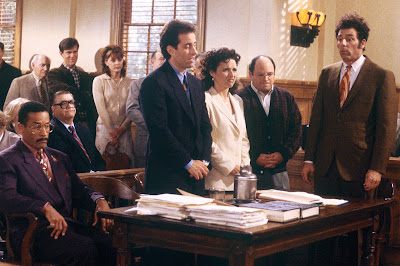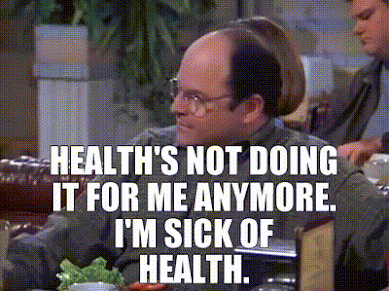The “Seinfeld” finale in which Jerry (Jerry Seinfeld), George (Jason Alexander), Elaine (Julia Louis-Dreyfus), and Kramer (Michael Richards) go to prison after violating The Good Samaritan Law could never have been what we wanted – needed – it to be. That is partially because when it comes to television conclusions, “everybody writes their own finale in their own head,” as Seinfeld co-creator and head writer Larry David said in a 2014 interview, “and often they’re disappointed, because it’s not what they wrote.” But it is also because television endings typically involve ceremony, significance, and a kind of ultimate enlightenment whereas “Seinfeld” was a show all about the quotidian, and the trivial, and a famed No Hugging, No Learning aversion to epiphanies. “Newhart’s” finale from 1990 has long been considered a paragon of the form given its twist, the eponymous character waking up to discover the entire series was just a dream of the character in “The Bob Newhart Show” (1972-1978), uproarious if revealing, returning to the way it was, sending its viewers home in the glow of cozy nostalgia. You can imagine the May 14, 1998, audience of 76.3 million wishing the “Seinfeld” finale was all a dream too. Because it wasn’t, the conclusion, despite the high concept, felt abrasively real. Seinfeld once noted that there was “nothing really likable about (the characters) except that they remind you of yourself.” If these characters were, on some level, us, rather than feeling celebratory, we were made to feel...culpable?
Perhaps because of its polarizing legacy, I found myself thinking less of The Finale’s broader cultural impact as its 25th anniversary approached than, simply, the quality of the episode itself, one in which NBC deciding to resurrect the Jerry TV pilot of Season 4 prompts the gang to jubilantly spirit off to Paris, only for the private jet to make an emergency landing in small town Massachusetts where the quartet mocking a robbery in progress lands them in jail for failing to help and then in court where their longstanding antisocial predilections are literally put on trial. It’s important to remember that David had left “Seinfeld” as head writer two years earlier, that The Finale was his return, and that in the year before it he had been writing and directing his feature film debut, a harshly received comedy called “Sour Grapes” that was released in April 1998. Indeed, it’s noticeable just how much The Finale feels like a movie.
For one thing, it runs an hour and fifteen minutes, an eternity for a sitcom, and contains a jarring amount of dead space, meaning moments and scenes that are strictly about advancing the plot. Those later seasons of “Seinfeld” often had a lot of plot but they tore through it at a galloping pace, always cognizant that humor came first. And though the conclusion’s most predominant move in bringing back a whole cavalcade of characters, from Babu to the Bubble Boy, wronged by our anti-heroic quartet to doom them is inspired, it also has the odd effect of repeatedly reducing our anti-heroic quartet to mere spectators in their biggest episode, fascinating in theory, but straining out considerable comedy in the practical application, leaving an episode that feels unbalanced.
It’s unfortunate because when the oversized Finale sweats the small stuff, it works to some degree. George angrily proclaiming that he’s “sick of health” when Jerry points out he’s still healthy is the one line from The Finale I’ve carried with me the last quarter-century while we are treated to the final few glorious bursts of Alexander and Seinfeld’s argumentative dynamic, both in the NBC offices and Jerry’s apartment where he lectures on the Laws of Peeing with the Bathroom Door Open. Elaine’s attempted cellphone calls to a friend in need at all the worst moments, meanwhile, is a funny thread that can’t help but lose a little gas simply on account of the episode’s length. (Kramer sort of comes across as an odd man out here, maybe because his storylines often involved harebrained schemes and the harebrained scheme here is the overarching A plot.) The Finale is never better, though, than the bookends.
It opens in the coffee shop where George’s sidesplitting skirmish with a woman (McNally Sagal, dry, really funny) in the booth behind him over her refusing to lend her table’s ketchup bottle foreshadows a fellow human refusing help as he, himself, and others, will refuse to help in just a little while. Even without what’s to come, however, this scene works in and of itself, evoking the society we live in, to paraphrase George in the legendary Chinese Restaurant episode, as crumbling, teetering. If there was an arc to the series, it was that the characters – George and Elaine in particular – seemed to get angrier as it went along, neurosis collapsing into bitterness, a sense of the characters wanting to break free from this 9-season cycle of suffering. (“I can’t spend the rest of my life coming into this stinking apartment every ten minutes,” Elaine confesses in Season 8, a line the incomparable Louis-Dreyfus imbued with genuine comic desperation, “to pore over the excruciating minutiae of every single daily event.”) In essence, that’s what the reboot of Jerry is meant to epitomize, breaking free from the cycle.
And while The Finale is sometimes an unsuccessful slog in seeing that anti-arc through, it’s what the end still suggests, the four characters in a holding cell that may as well be the coffee shop, still focusing on the trivial as they get set to endure their year-long sentence behind bars. That the show ends with a repeat of the first conversation from “The Seinfeld Chronicles” doesn’t feel lazy or even nostalgic, but crucial and pointedly cruel. Their cycle of suffering begins anew.






No comments:
Post a Comment